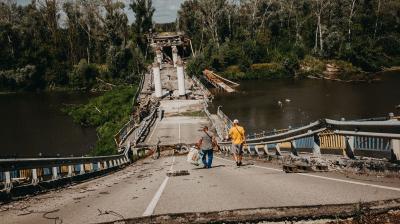News
On Wednesday 3 April, Clingendael Institute researcher Julia Soldatiuk-Westerveld moderated a knowledge exchange event on behalf of the Dutch Ministry of Foreign Affairs on aid in Ukraine. The event brought together a diverse group of Dutch civil society organizations, who are active in Ukraine. The Program Director Recovery and Reconstruction of Ukraine at the Ministry of Foreign Affairs, Robert-Jan Siegert and Ukraine's Ambassador to the Netherlands Oleksandr Karasevych gave opening remarks.
The general objective of the meeting was to collect insights from Dutch civil society organizations (CSOs) to extract overarching lessons from ongoing assistance to Ukraine. The knowledge exchange event covered two main topics: the first addressed the shift from emergency aid to early recovery and livelihood, while the second part delved into the significance of human-centred recovery.
The information gathered during the event will serve as input to guide the Dutch delegation's position at the Ukraine Recovery Conference in Berlin on 11 and 12 June 2024. Additionally, the wide-ranging and varied array of participating organizations transformed the event into a beneficial networking opportunity for all CSOs involved, who were able to exchange firsthand experiences.
While the majority of participants agreed that wait until the end of the war to start reconstruction is not an option, many also stressed the importance of the continuation of maintaining the provision of emergency and humanitarian aid. The general consensus was that this transition should be rooted in a local perspective and guided by Ukrainian CSO's to ensure Ukrainian ownership and agency. The CSO representatives also emphasized the significance of supporting informal networks, investing in strong local partnerships and facilitating capacity building among healthcare staff to ensure a human-centred recovery, that includes Mental Health and Psychosocial Support (MHPSS).






